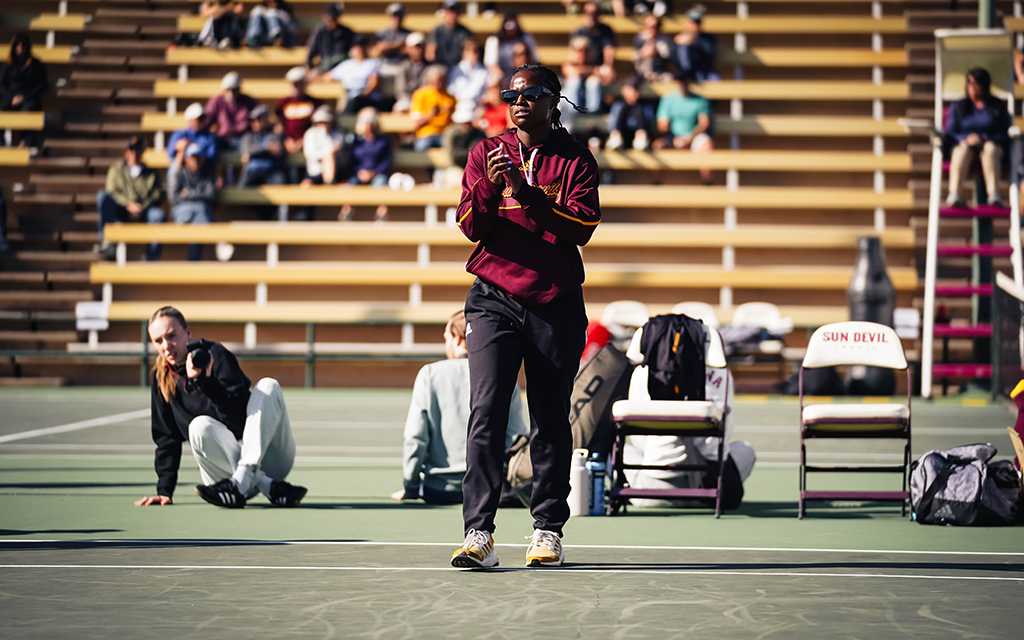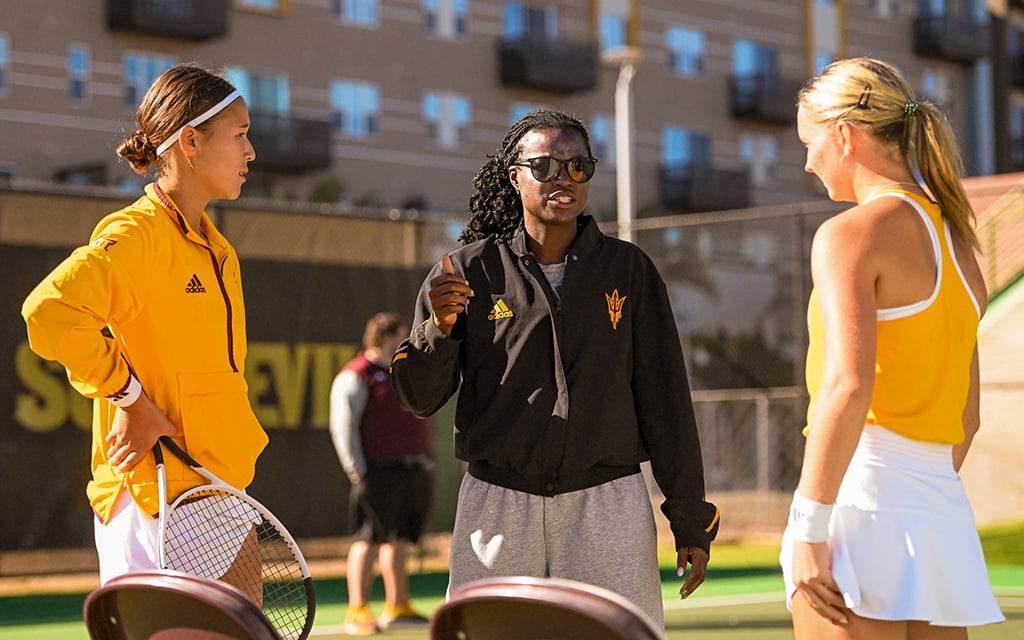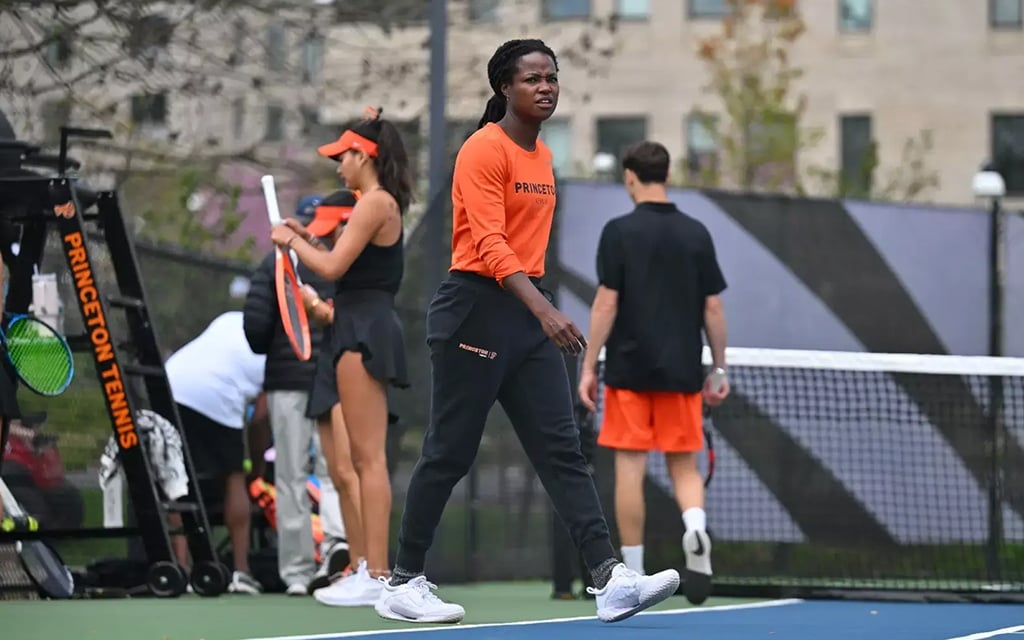TEMPE – In the past year, the ASU women’s tennis program has undergone about as much change as one can imagine. Longtime legendary coach Sheila McInerney, who led the team for 40 years, retired ahead of the team’s transition to the Big 12 Conference.
The roster was completely revamped, too, with only three returners from the previous season. But the Sun Devils have found a way to stay competitive, while still improving, even with only one upperclassman on the roster.
All signs point to the methods of ASU coach Jamea Jackson, whose No. 23-ranked team faces its first conference test Thursday against Utah.
“The more you understand any sport, the more fun it is, right?” she asked after a recent match.
There are no better words to summarize the coaching philosophy and team culture that Jackson has brought to Tempe in her inaugural season at the helm for the Sun Devils.
What makes Jackson different
Jackson is about as charismatic and personable as any tennis coach you’ll find in competitive Division I athletics. Before matches, she greets fans personally and thanks them for coming.
During warmups, she drifts around the court, clipboard in hand, as she tweaks technique with the players. Before competition, she even dances with her players to the pregame music blaring over the speakers.
Jackson and associate coach Erik Kortland have emphasized intentional repetition and problem solving as core tenets of their teachings.
“A lot of it’s knowing your players and knowing their psyche, and the more time you spend with them, you begin to understand what they’re thinking at certain times, and they know what you’re thinking at certain times too,” Jackson said. “They’re incredibly intuitive.”
Practicing with intention and engaging players to emulate on-court action instead of repetitive, potentially hurtful drills are one way the coaching staff best utilizes training.
Jackson said that because so much of tennis is based on small adjustments, utilizing the time between points for strategy is key — while also knowing which players she should be right next to in high-pressure situations and which she should be far away from.
“You get a little bit of time in between every point to recalibrate, to stay the course, to adjust,” Jackson said. “If you miss a ball on the net and you do something different to hit it somewhere else, that’s problem solving. And so it’s this little mini kind of exercise that happens after each and every single point.”
For Patricija Spaka, a senior from Latvia who has experienced the changes more than anyone, Jackson’s relatability and professional experience was an important part of easing her transition into the role.
“She used to be a pro athlete herself, so I feel like her approach was a little different in terms of how she sees tennis in general, and how she wants us to improve and get better,” said Spaka, who is affectionately dubbed “Sparky” by the team.
This sentiment of camaraderie is echoed throughout the team as an important part of Jackson’s success, but research on coaching turnover and its effects usually suggests otherwise, at least with this specific factor.
Dr. Amber M. Shipherd, a performance psychology professor at Texas A&M University Kingsville, and a certified mental performance consultant with the Association for Applied Sport Psychology, researched “Coach Turnover And Its Impact on Student-Athletes And Team Dynamics” in 2019. Shipherd said new coaches who are more similar in age or skill level to their players can often be less respected by their athletes.
But Jackson’s professional experience, paired with other personality traits, has made her transition into the role as smooth as possible despite the immense changes the team has faced.
Positive reinforcement
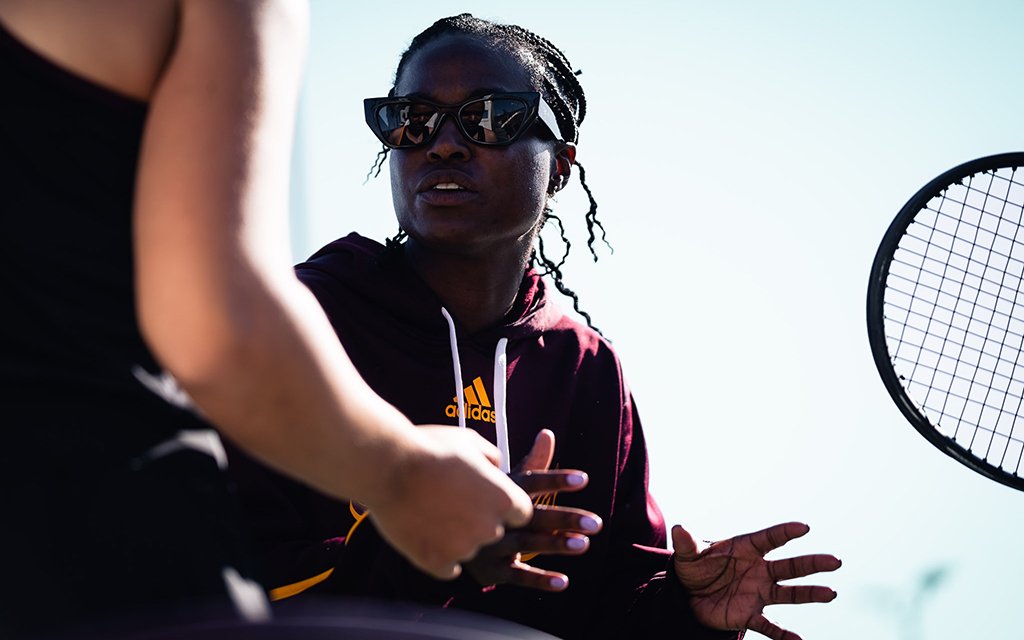
ASU women’s tennis coach Jamea Jackson coaches her team during a match, leading with positive reinforcement. (Photo courtesy of Sun Devil Athletics)
The most important of these personality traits is Jackson’s emphasis on positive reinforcement to motivate players.
Jackson isn’t preaching positivity to deaf ears. It’s not classic coach phrases of hyperbole or blind belief, but rather constant reassurance and support.
“Her approach is so genuine, and everything she tells you is completely how it is,” said Sara Svetac, a sophomore from Croatia and one of the three returners on the team. “For me, what works best is positivity. When you see your coach on the side, and you see that they believe in you and they’re positive about your game, about your practice, about your matches, it definitely makes it easier for you to play better.”
For Lily Taylor, a recently signed freshman from Australia, this style has made adapting to the collegiate game easier.
With the strong differences between her experience in competitive tennis overseas to team-based college tennis, she said positivity is important to her game and the team as a whole.
Coaches can directly communicate with players between points, which is different than any higher level of the game. Thus, rapport matters even more.
“She just loves it so much that her joy and the positiveness just comes to us,” Spaka said. “And because of that, I just want to do better.”
Shipherd’s coaching turnover research supports this, as it was one of the study’s key findings.
“Especially now, those types of things: building the rapport with the players, getting to know them as individuals, is probably even more important now than it was five or six years ago when we did this research,” Shipherd said. “So I think if the new coach is able to do that, and is invested in the players, and shows that she’s there for the players themselves, and actually cares about them as human beings, I think the likelihood of having a positive impact is even more so now.”
Culture from within
The players have also made a conscious effort for off-court support and growing the team culture, despite the larger changes and roster turnover.
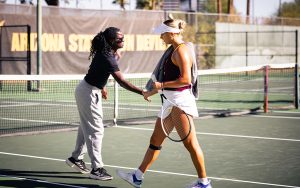
ASU women’s tennis coach Jamea Jackson, left, offers encouragement to Emilija Tverijonaite during practice, a key element of her positive coaching style. (Photo courtesy of Sun Devil Athletics)
“We have a brand new team, but when all of the girls came and we built chemistry, I feel like we have a great connection,” said Emilija Tverijonaite, a sophomore and returner from last year’s team. “That’s what kind of encourages us to do better and be better, and that’s what gives us the best results.”
This camaraderie doesn’t just start and end within the seven-deep roster of the women’s team. Spaka said their relationship with the men’s tennis team also has grown, another building block of culture flourishing under Jackson.
During Sun Devil home matches, the men’s team screams louder than anyone in support of their counterparts.
“We were close, but not this close. Like this is personal,” Spaka said. “You can see the benefits of it, and I feel like the coaches are really invested in that, to be sure that this is a community.”
It’s a privilege
As the Sun Devils brave the gauntlet of Big 12 competition for the first time, the jury is still out on how the team will perform when it matters. At 5-3 overall and 3-0 at home during non- conference play, including an electric win over No. 15 Pepperdine on Feb. 1, the momentum may just be starting for the revamped squad.
Though strategy and player performance will ultimately decide the fate of the season, and seasons to come, building team culture may be the most important piece of Jackson’s first season.
And all signs point to that being a success.
“In terms of actually having a successful tenure as a coach and developing a successful team and successful players, I think those personality variables are even more relevant and important,” Shipherd said. “Because, again, if I’m able to connect with you really well and really easily, you’re going to be more motivated to work hard for me.”
For the players, expectations are high as the team strives for an NCAA tournament bid. For Spaka, the squad’s only senior, appreciating each moment and match along the way is equally a priority.
“You want to look at it as a privilege, more (than), ‘I’m just here and that’s about it; I’m just going to be here for four years, and that’s it,’” Spaka said. “This is a life opportunity. I’m on my last semester, and I only have a chance to work with these coaches for a year, but I’m taking the whole advantage of it.”
Though expectations are high for Jackson, she acknowledges the team is just getting started. There’s room for improvement, despite the early successes.
“That’s the exciting part,” Jackson said.
And thanks to the smooth transition, she can always get a hold of her legendary predecessor for any help.
“The best players in the world, they think they can do anything, they think they shouldn’t miss,” Jackson said. “They miss, of course. And they get right back out there, and they’re like, ‘I can do this. I can do this.’
“And that’s a skill that is going to serve you well on-court, off-court, in the classroom, with your families, with whatever job you eventually have after you stop playing.”

